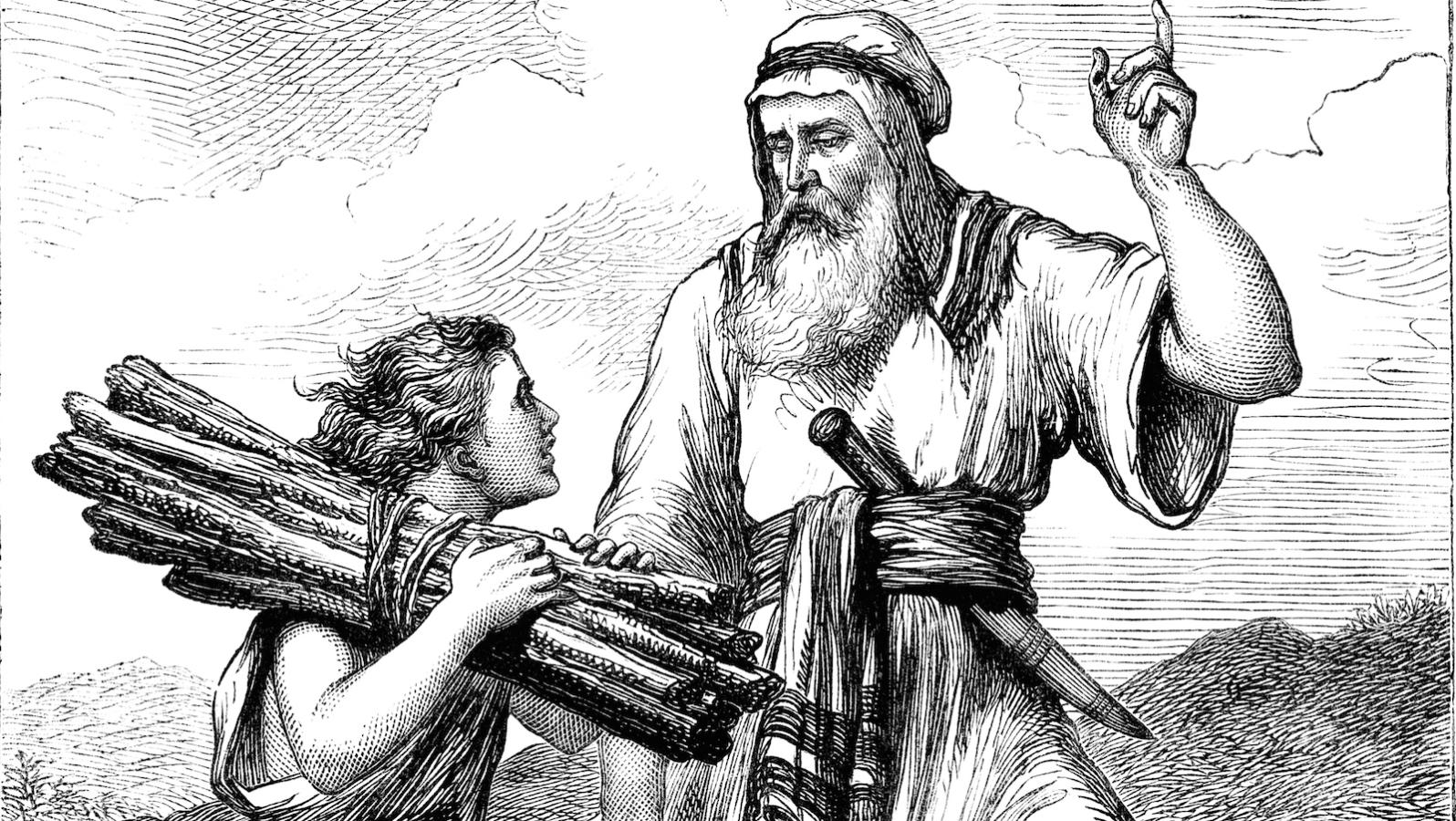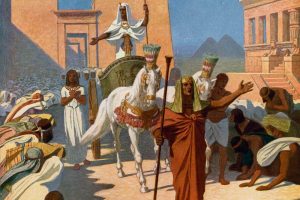Test or Banner?
Test or Banner?

Shalom,
This Shabbat we will be reading Torah portion “Va’Yera” in the book of Genesis – Be’Reshit.
In this Torah portion the root ‘love’ appears for the first time in the Bible.
וַיֹּאמֶר קַח-נָא אֶת-בִּנְךָ אֶת-יְחִידְךָ אֲשֶׁר-אָהַבְתָּ, אֶת-יִצְחָק, וְלֶךְ-לְךָ, אֶל-אֶרֶץ הַמֹּרִיָּה; וְהַעֲלֵהוּ שָׁם, לְעֹלָה, עַל אַחַד הֶהָרִים, אֲשֶׁר אֹמַר אֵלֶיךָ
And He said: ‘Take now thy son, thine only son, whom thou lovest, even Isaac, and get thee into the land of Moriah; and offer him there for a burnt-offering upon one of the mountains which I will tell thee of.’
But, what is so difficult, is to relate to the concept of ‘love’, when it is used in the context of bringing an offering of one’s own only beloved son.

Over generations, this paradoxical command of G-d raised many questions and many different attempts have been made to rectify the paradox of the same G-d forbidding to sacrifice one’s children:
לֹא יִמָּצֵא בְךָ מַעֲבִיר בְּנוֹ וּבִתּוֹ בָּאֵשׁ
There shall not be found among you any one that maketh his son or his daughter to pass through the fire. (Deut. 18:10), telling Abraham to do exactly the same to his own only son.
How could this be possible?
Another major question is, of course, how Abraham, who argued with G-d about the destruction of Sodom and Gomorra, trying to save the people there, did not say a word and did not attempt to save his own son?
We will try to present a few ideas, which could possibly help in understanding the narrative of this episode of binding Yitzhak to the altar, as is called in Hebrew
Akeidat Yitzhak – עקדת יצחק
After have listened to G-d’s will, Abraham walks for three days to Mount Moriah to bring his son Yitzhak as an offering.
Maimonides points out that this was time spent contemplating the act, that it not be said that it was done recklessly.
The Midrash has Satan placing numerous physical obstacles in Abraham’s way.
Yes, Abraham had the same thoughts of turning back that we have. Yet Abraham continued.
On his way he passes through the valley of Ben Hinom where pagans are sacrificing their children to the Molech god. He, certainly no less than we, is struck by the equivalence.
The Midrash has the Satan asking Abraham, “Are you out of your mind?! Tomorrow they will call you a murderer!”
Yes, Abraham had the same pangs of conscience that we have. And yet, Abraham still continued.
Upon climbing the mountain, Abraham prepares to carry out the will of his Creator. He draws the knife, raising it in determined trepidation.
The universe shakes in fear and trembling. And then, at precisely the moment when God and morality are about to be dashed on the altar, a heavenly voice rings out:
וַיֹּאמֶר, אַל-תִּשְׁלַח יָדְךָ אֶל-הַנַּעַר, וְאַל-תַּעַשׂ לוֹ, מְאוּמָה: כִּי עַתָּה יָדַעְתִּי, כִּי-יְרֵא אֱלֹהִים אַתָּה, וְלֹא חָשַׂכְתָּ אֶת-בִּנְךָ אֶת-יְחִידְךָ, מִמֶּנִּי
“Lay not thy hand upon the lad, neither do thou anything unto him; for now I know that thou art a God-fearing man, seeing thou hast not withheld thy son, thine only son, from Me” (Gen. 22:12).

And we (as distant observers) walk down from the mountain numbed in confusion. What are we to make of what just happened?
The Midrash states: “‘Nor did it come into My heart’ (Jeremiah 7:31)—that Avraham should sacrifice his son on the altar.”
Another Midrash illustrates the point more vividly:
Said Rabbi Aha: Abraham said to Him, “I will explain my complaint before You. Yesterday, You said to me: ‘for in Isaac will be called your seed,’ and You retracted and said: ‘Take now your son.’ Now You say to me, ‘Stretch not you hand toward the boy.’
The Holy One, blessed be He, said to him: ‘I shall not profane My covenant, neither shall I alter the utterance of My lips’ (Ps. 89:35).
When I said to you, ‘Take,’ I was not altering the utterance of My lips. I did not say to you, ‘Slaughter him,’ but, ‘Bring him up.’
You have brought him up; [now] take him down.”
As such, the narrative of the Binding – עקדה forces us to assume a God who challenges man to transcend himself in complete and utter devotion.
In realizing that God is moral by all standards and would never ask of man anything less, man can make the ultimate movement of faith and suspend judgment through acceptance of the absurd.
R. Hayim of Brisk, expounded the above Midrash (Ber. R. 56:8).
It seemed to Abraham as though the words of God were contradictory.
Nevertheless, he overcame the pangs and torments of contradiction, rose up early in the morning and saddled his female donkey.
When the angel appeared to him and revealed the third verse which harmonized the two contradictory verses, then Abraham rose up and questioned…
As long as the third harmonizing verse had not yet been revealed, Abraham had no right to question God’s word, and for this reason he contained himself until the end of the epic.
Another Midrash (Ber. R. 55:1) notes that the word “test” (nisa – נסה) as appears in the first verse of this Torah portion:
וַיְהִי, אַחַר הַדְּבָרִים הָאֵלֶּה, וְהָאֱלֹהִים, נִסָּה אֶת-אַבְרָהָם
And it came to pass after these things, that God did prove Abraham (Gen. 22:1)
is linguistically related to the word ‘banner/flag’
ness – נס
Therefore, the verb לנסות could be interpreted as ‘to test’ on one hand, but also ‘to raise’, on the other.
In this context we can interpret that the intended outcome G-d’s command to Abraham to bring his only son as a sacrifice was to let Abraham rise to a new level of consciousness and faith, eventually declaring the sanctity of life.
Thus, Abraham’s test being a highly raised banner reveals to the world that Man is worthy of creation and the value of human life is sacred.

Shabbat Shalom,
Orly & Yoel
You can find our previous posts at:
https://www.ulpanor.com/category/newletter/





